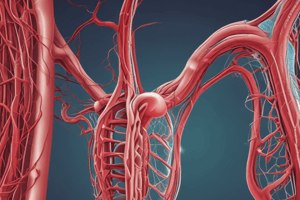Podcast
Questions and Answers
Which blood vessel type connects arteries to veins?
Which blood vessel type connects arteries to veins?
- Capillaries (correct)
- Oxygenated vessels
- Arteries
- Veins
What prevents blood from flowing backward in veins?
What prevents blood from flowing backward in veins?
- Muscular contractions
- Thick walls
- One-way valves (correct)
- Pressure systems
What is a primary difference between arteries and veins in terms of structure?
What is a primary difference between arteries and veins in terms of structure?
- Arteries have thinner walls than veins
- Veins have more elastic walls than arteries
- Arteries have thicker, more muscular walls (correct)
- Veins are always wider than arteries
How does blood move from arteries to veins?
How does blood move from arteries to veins?
What characteristic of veins helps in the flow of blood toward the heart?
What characteristic of veins helps in the flow of blood toward the heart?
What role do skeletal muscle movements play in blood flow?
What role do skeletal muscle movements play in blood flow?
Which of the following vessels carries blood away from the heart?
Which of the following vessels carries blood away from the heart?
Which statement about capillaries is true?
Which statement about capillaries is true?
Flashcards
Arteries
Arteries
Blood vessels that carry blood away from the heart.
Veins
Veins
Blood vessels that carry blood towards the heart.
Capillaries
Capillaries
Tiny blood vessels that connect arteries and veins.
Why do arteries have thick walls?
Why do arteries have thick walls?
Signup and view all the flashcards
Why do veins have thinner walls?
Why do veins have thinner walls?
Signup and view all the flashcards
How do veins get blood to the heart?
How do veins get blood to the heart?
Signup and view all the flashcards
How do veins prevent backflow?
How do veins prevent backflow?
Signup and view all the flashcards
What do arteries and veins transport?
What do arteries and veins transport?
Signup and view all the flashcards
Study Notes
2.3 Highways and Byways
- Blood travels in one direction, unlike cars on a two-way street
- Arteries and veins are one-way streets in the body
- Blood travels from arteries to capillaries, then to veins, and back to the heart
- Blood moves due to the heart's pumping action
Veins
- Blood pressure in veins is lower than in arteries
- Veins have one-way valves to prevent backflow
- Valves close when blood tries to flow backwards
- Skeletal muscle contractions squeeze veins, aiding blood flow towards the heart
Arteries
- Blood in arteries flows away from the heart
- High blood pressure requires thick, elastic artery walls
- Artery walls are made of muscle tissue
Capillaries
- Tiny blood vessels connecting arteries and veins
- They facilitate the exchange of oxygen and carbon dioxide
Studying That Suits You
Use AI to generate personalized quizzes and flashcards to suit your learning preferences.




